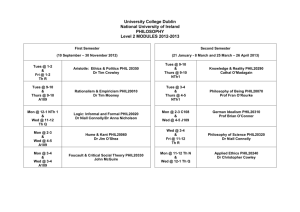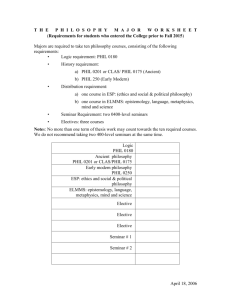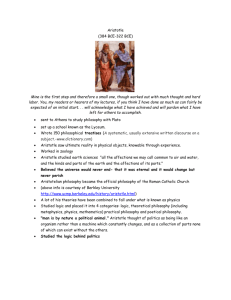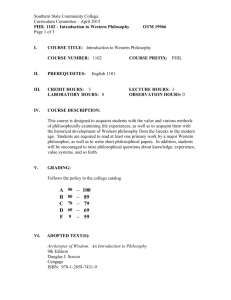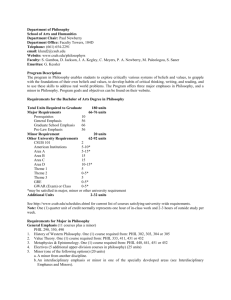Level 2 MODULES 2013-2014 - University College Dublin
advertisement
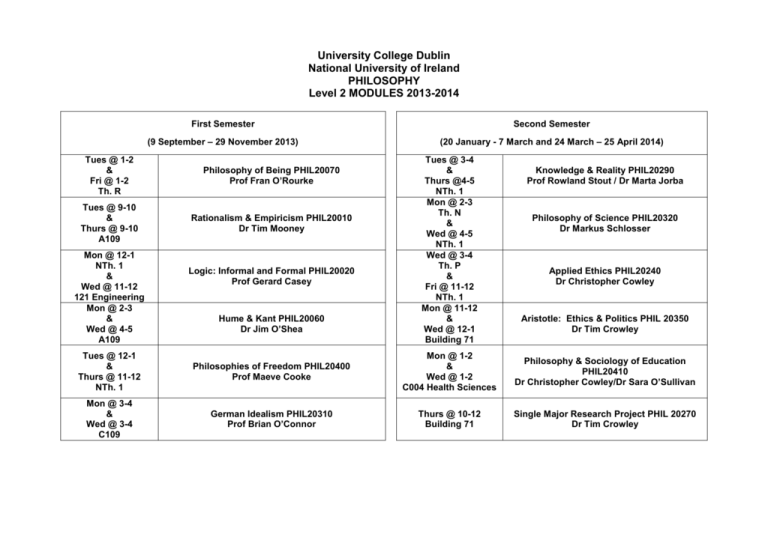
University College Dublin National University of Ireland PHILOSOPHY Level 2 MODULES 2013-2014 First Semester Second Semester (9 September – 29 November 2013) (20 January - 7 March and 24 March – 25 April 2014) Tues @ 1-2 & Fri @ 1-2 Th. R Philosophy of Being PHIL20070 Prof Fran O’Rourke Tues @ 9-10 & Thurs @ 9-10 A109 Rationalism & Empiricism PHIL20010 Dr Tim Mooney Mon @ 12-1 NTh. 1 & Wed @ 11-12 121 Engineering Mon @ 2-3 & Wed @ 4-5 A109 Logic: Informal and Formal PHIL20020 Prof Gerard Casey Hume & Kant PHIL20060 Dr Jim O’Shea Tues @ 3-4 & Thurs @4-5 NTh. 1 Mon @ 2-3 Th. N & Wed @ 4-5 NTh. 1 Wed @ 3-4 Th. P & Fri @ 11-12 NTh. 1 Mon @ 11-12 & Wed @ 12-1 Building 71 Knowledge & Reality PHIL20290 Prof Rowland Stout / Dr Marta Jorba Philosophy of Science PHIL20320 Dr Markus Schlosser Applied Ethics PHIL20240 Dr Christopher Cowley Aristotle: Ethics & Politics PHIL 20350 Dr Tim Crowley Tues @ 12-1 & Thurs @ 11-12 NTh. 1 Philosophies of Freedom PHIL20400 Prof Maeve Cooke Mon @ 1-2 & Wed @ 1-2 C004 Health Sciences Philosophy & Sociology of Education PHIL20410 Dr Christopher Cowley/Dr Sara O’Sullivan Mon @ 3-4 & Wed @ 3-4 C109 German Idealism PHIL20310 Prof Brian O’Connor Thurs @ 10-12 Building 71 Single Major Research Project PHIL 20270 Dr Tim Crowley Level Two Module Outlines 2013-14 SEMESTER ONE Philosophy of Being PHIL 20070 A systematic discussion of fundamental themes in metaphysics, based on selected texts from Parmenides, Plato, Aristotle, Aquinas, Hegel, and Heidegger. Topics will include: Nature and purpose of metaphysics. Metaphysical nature of human existence. Question of being. Validity of metaphysical knowledge. Philosophy as search for unity. Affirmation of existence . Principles of being/laws of thought. Concept of being (Parmenides: Being is, Nonbeing is unintelligible. Hegel: Being and Nothing are identical). Unity and diversity of existence. Analogy: metaphor as illustrative of the universal affinity of bein gs. Plato's theory of being. Aristotle's search for substance. Aquinas' distinction between essence and existence. Existence of God. Theory of Evolution. Causality, freedom and personhood. Rationalism and Empiricism PHIL 20010 How do modern treatments of substance and causality differ from what came before? Do we require certain knowledge, or is probable knowledge enough? Do we really need to go outside nature to explain nature? Are there such things as innate ideas, or is the mind at its beginning a 'blank slate' awaiting sense impressions from outside? Does my identity lie in the unconscious, or in conscious experiences I can call my own, or both? In this course we will explore these questions, and others, by lookin g at the contrasting ideas and arguments put forward in the great philosophical traditions of Rationalism and Empiricism. Following a brief consideration of Descartes' later work, the philosophers to be examined in most detail will be Spinoza, Locke, Berkeley and Leibniz. Logic: Informal and Formal PHIL 20020 Logic is a study of the central notions of argument and inference. The module begins with an treatment of Traditional or Aristotelian Logic, continues with a brief analysis of argumentation in everyday informal contexts and moves on to consider the construction and evaluation of argument in modern formal contexts. Notes will be supplied for the Formal Logic section of the Module and these will be made available on Blackboard. Schematic notes on Rhetoric will also be made available to students on Blackboard. Anthony Weston's "A Rulebook for Arguments" is required reading and should be available for purchase from the College Bookshop. It is recommended that students read some supplementary material on informal logic, such as Madsen Pirie's "How to Win Every Argument" or Jay Heinrichs's "Thank Your for Arguing". Level Two Module Outlines 2013-14 Hume & Kant PHIL 20060 In this course we will study two of the most important philosophers of the Eighteenth century Enlightenment period: David Hume and Immanuel Kant, with particular focus on Kant's 'Critique of Pure Reason' (1781; we will follow the lecturer's book on Kant: James R. O'Shea, _Kant's Critique of Pure Reason: An Introduction and Interpretation_, Acumen, 2012). Topics will include scepticism and the nature of knowledge and belief; consciousness and the nature of the self; perception, identity, and causality. Hume's empiricist and sceptical naturalist outlook was famously opposed by the 'transcendental idealism' of Kant. Descendants of Humean and Kantian views are very influential in disputes today across the spectrum from metaphysics and epistemology to aesthetics, morality, and political philosophy, so this course will provide important background for many of our level three courses. (Students should be aware that Kant's writing in particular is somewhat technical and would be best approached by students who have already completed one or more philosophy modules.) Philosophies of Freedom PHIL 20400 The idea of autonomy is a central component of the modern Western conception of freedom. The course focuses on autonomy but also seeks to situate it within a more encompassing conception of individual freedom. It examines the idea of autonomy as it features in the work of Rousseau, Kant, Hegel and Nietzsche. It will also consider twentieth century critiques of autonomy, especially feminist critiques, as well as twentieth century and more recent attempts to re -articulate autonomy (for example, Foucault's). German Idealism PHIL 20310 The period of European philosophy designated as German Idealism witnessed an upsurge of theoretical innovations. The main philosophers of this movement -- Kant, Fichte, Schelling and Hegel -- redrew the theories of just about every topic they considered: selfhood, freedom, the state, beauty and art, history, nature and science, and religion. They left behind a legacy of concepts which continue to shape the contemporary world: e.g. autonomy, dialectic, aesthetic judgment, recognition and universal history. This module will, through close textual readings, consider the contentions and arguments of these philosophers on a selected range of from each of these topics. Level Two Module Outlines 2013-14 SEMESTER TWO Knowledge and Reality PHIL 20290 This course examines central philosophical issues in epistemology and metaphysics, or knowledge and reality. What is the nature of our knowledge of the world? Is our knowledge grounded primarily in sense experiences, or in reason (intellect)? What is knowledge, that is, how should that concept e defined or analysed? What are the limits of knowledge? How might we address sceptical challenges to the very possibility of knowledge in general or of various kinds (knowledge of self or of the 'external world', inductive knowledge, and so on)? On the side of reality, what are the fundamental kinds of things (substances, beings) that we know to exist in the world? Metaphysics is the rational investigation of the most general featur es of reality and of the human being: what is it to be a self, or a mind, or to have free will (if we do)? What is time? What are concepts and universals? How are language and thought related to one another? What is it to be the 'same' thing through change? These are the sorts of questions that are typically examined in this course, with the particular focus varying each year (to be clarified at the start of the module). Philosophy of Science PHIL 20320 This course will subject the aims and methods of science to philosophical analysis; the basic question we want to answer is: what is science? We will start by asking whether scientific theories and the practice of science have distinctive features which allow us to draw a clear distinction between science and other human enterprises. It has been felt that a 'demarcation criterion' is particularly important for disqualifying as real science, 'pseudo-science' like Creationism and Homeopathy. We will examine some alleged demarcation criteria. It is difficult to come up with a demarcation criterion or an exact definition of science but there are some things that are clearly true of science: science seeks to explain natural events, and to formulate laws of nature. We will ask what it is to explain a natural event; and what is a law of nature? We will also investigate the general aim of science. Does science attempt to give a true account of the world; or just a useful or 'empirically adequate account? A related question is whether scientific theories are committed to the existence of the unobservable entities they posit. Science, it is often claimed, aims for an objective view of the world and this aim is facilitated by its methods. Feminist philosophers of science have subjected the notion of objectivity and the claim that science is objective to critical scrutiny ; we will examine this critique. Level Two Module Outlines 2013-14 Applied Ethics PHIL 20240 The subject of ‘Applied Ethics’ is enormous and diverse: it would be impossible to cover even a selection of relevant topics without superficiality. In philosophy, it is always better to go narrow and deep, and so it will be with this course. I will therefore NOT be saying anything about euthanasia, abortion, animal rights, just war or world poverty, but will be focusing entirely on the relatively narrow topic of PERSONAL RELATIONSHIPS. Ethics typically concerns the role other people do and should play in restricting my actions; therefore, before we can understand the larger ethical questions about what should be done in various complicated situations, we should start by examining these relationships. After all, most of our ethical intuitions are cultivated during childhood within the context of relationships of family, friendship, and institutional memberships. And most of the ethics that we ‘apply’ as adults is also within the context of particular relationships with friends, lovers, family and colleagues. In order to understand the ethical dilemmas that partly constitute personal relationships, we will also have to say something about the nature of love, of autonomy, and of identity – all three of these are rich philosophical themes. The context of our discussions will be the typical ethical dilemmas that we encounter in the home, in the pub, in the workplace, and not the policy dilemmas that trouble government ministers. Students should note that there is an attendance requirement. If the student does not attend at least FOUR of the seven tutorial sessions without a good reason, their second essay will not be marked. Aristotle: Ethics and Politics PHIL 20350 As Aristotle sees it, ethics and politics are both concerned with the same thing: the pursuit of happiness. His great work, the 'Nicomachean Ethics' is concerned with identifying what an individual's happiness consists in, while his 'Politics' attempts to identify which political system will best promote the happiness of each citizen. Both works are maste rpieces of moral and political philosophy, and remain of great interest and influence today. In this module we will examine the key doctrines that Aristotle argues for in these seminal texts. Aristotle's work will be examined in its appropriate historical and philosophical context, in particular in relation to his great predecessors, Socrates and Plato. We shall also consider Aristotle's influenc e on modern moral and political philosophy. Level Two Module Outlines 2013-14 Philosophy and Sociology of Education PHIL 20410 What is education? Why does every Irish child have to go to school? What does education do to us? What should we be trying to teach our children in the formal educational environment? Why do we not all have access to the same educational opportunities? This module will address these important questions by engaging with the two contrasting social science disciplines of philosophy and sociology. The module is divided into three sections. In the first section students will philosophically examine what the concept of education means, not only with respect to the traditional subjects such as English and Mathematics, but especially with the more controversial subjects such as citizenship, religion and morality. We will also examine the nature of knowledge, skill, intelligence, and character, and the problem of assessing them fairly and accurately. In the second part of the course we will look at sociological theory and research that explores the role of education in contemporary societies and the changing political economy of education. Students will explore both how education is organised and how sociologists analyse this key social institution. The final part of the course will focus on the relationship between education and inequality and will explore issues including dimension s of inequality, school choice and class differentials in educational achievement. How can philosophy and sociology help us better understand how education can contribute to and alleviate different social inequalities? Single Major Research Project PHIL 20270 The Undergraduate Research Project offers second year Philosophy students the opportunity of working under the close supervision of a member of staff to produce a sustained in-depth piece of work (5,000 word max.). Successful completion of the project will require a significant degree of self-discipline and self-motivation, as it demands much independent research and study. Students are free to pursue a philosophical topic of their choice, on condition that the module co -ordinator considers the topic viable, and there is a member of staff who is able and willing to act as supervisor. Students should therefore begin to think about and prepare their proposals as soon as possible in the first semester. Students must also atte nd a weekly seminar, in which they will have the opportunity to present and share the results of their research with their fellow students. The project is due at the end of the eighth week of the second semester. Level Two Module Outlines 2013-14
